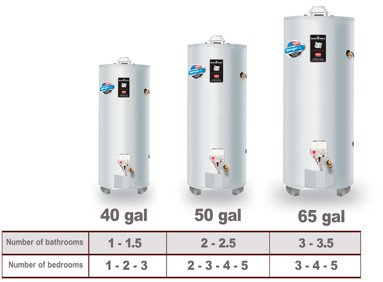Water Heater Size and Efficiency Considerations
We frequently take for granted the cozy, soothing embrace of a hot shower following a demanding day. It’s a basic pleasure that we realize when we enter a shower that is freezing because the water heater isn’t working properly. Size and efficiency are two important factors to take into account when choosing the best water heater for your house, since they can have a big impact on both your daily comfort and energy costs. We’ll go into the topic of water heater efficiency and sizing in this in-depth article to help you choose the right water heater for the hot water demands of your home.
The Importance of Water Heater Size
It’s important to discuss the basic issue of sizing before delving into the specifics of water heater efficiency. You may experience discomfort and annoyance if your water heater is too small for the demands of your home, leaving you without enough hot water. Conversely, an excessively large water heater may lead to greater utility bills and needless energy usage. As a result, choosing the appropriate size is essential for both affordability and comfort.
1. Household Size: Taking into account the number of occupants in your home is the first step in selecting the right size water heater. More hot water is usually needed in larger households to meet daily demands.
2. Peak Demand: Consider your highest point in hot water use. Do you regularly run hot water equipment like dishwashers and washing machines, or do several family members shower at the same time?
3. Flow Rate: Your showerhead and faucet flow rates are important. Make careful to account for the additional hot water needed for high-flow fixtures in your calculations.
4. Recovery Rate: The rate at which a fresh water tank can be heated by the water heater. For families that require a lot of hot water, a higher recovery rate is advantageous.
5. Location: Take the weather into account. The temperature of the incoming water is lower in colder climates, thus the water heater has to work more to attain the target temperature.
How to Choose the Correct Water Heater Size
You’ll need to do a quick calculation to figure out the appropriate water heater size for your house. Here’s a detailed how-to:
Step 1: Determine the Total Fixture Flow Rate
- Make a list of every fixture in your house that uses hot water, such as washing machines, dishwashers, faucets, and showers.
- Calculate each fixture’s flow rate in gallons per minute (GPM). Usually, the fixture itself or the manufacturer’s paperwork contain this information.
- To find the overall fixture flow rate, add up each fixture’s GPM.
Step 2: Determine the Maximum Demand
- Calculate the most hot water fixtures that could operate concurrently at peak use. Take into account the fixtures that will be in use in the event that, for instance, a dishwasher and two showers are running simultaneously.
- To find your peak demand GPM, multiply the total fixture flow rate by the number of fixtures operating at the same time.
Step 3: Determine the Tank Size
- Utilizing your peak demand GPM, choose a water heater with a First Hour Rating (FHR) that corresponds with it. The FHR gauges a water heater’s capacity to handle scenarios with high demand.
- Make sure the tank capacity is enough to meet your highest demand.
Heater Efficiency of Water
Efficiency should be taken into account after you’ve chosen the appropriate size for your water heater. In addition to saving energy, an efficient water heater also lowers your utility costs. The following are some crucial factors for efficiency:
1. Type of Fuel:
- Electric Water Heaters: These heaters are renowned for being straightforward and simple to install. But as compared to other fuel sources, their operating expenses are typically higher.
- Gas Water Heaters: In the long term, natural gas or propane water heaters are usually more economical and energy-efficient. They use less energy and heat water more quickly.
2. EF, or Energy Factor:
The entire efficiency of a water heater is indicated by the Energy Factor (EF). Greater efficiency and reduced energy usage are indicated by higher EF ratings.
3. Tankless versus Tank:
- Traditional water heaters with a storage tank are known as tank water heaters. Due to the fact that they always keep hot water, even when not in use, they are typically less energy-efficient.
- Water heaters that are tankless, also known as on-demand water heaters, are extremely efficient since they only heat water when it is required. They don’t need a storage tank, therefore they save space as well.
4. Water Heaters with Heat Pumps:
An extremely effective solution for heating water is a heat pump water heater, which uses heat from the surrounding air. They might cost more up front, but they are more energy-efficient.
Reconstruction and Expert Services
Maintaining the longevity and efficiency of your water heater requires routine maintenance. If you would want a competent specialist to inspect and tune up your system on a yearly basis, consider scheduling maintenance checks. This can increase efficiency and dependability by identifying and resolving possible problems early.
Professional services, such installing and local options for water heater replacement, should be carried out by qualified experts in addition to routine maintenance. Their proficiency in accurately sizing and installing water heaters guarantees both maximum efficiency and security.
Consulting with plumbing experts is essential when choosing the best water heater for your house and keeping it operating efficiently. They are able to evaluate your unique requirements, suggest the best water heater, and offer professional installation and upkeep services.
In conclusion, selecting the appropriate water heater size and efficiency is essential for both the energy efficiency of your home and your hot water needs. You can have a consistent supply of hot water and save money on electricity by carefully evaluating your home’s needs and considering your options. In order to maintain your comfort and satisfaction, don’t be afraid to seek professional advice when necessary. Keep in mind that routine maintenance and professional services are essential to maintaining your water heater functioning at its peak.
It is advised that you get in touch with https://www.true-plumbing.com/ for expert water heater services, such as installation and maintenance, as they can help you make the best decisions for your house.







